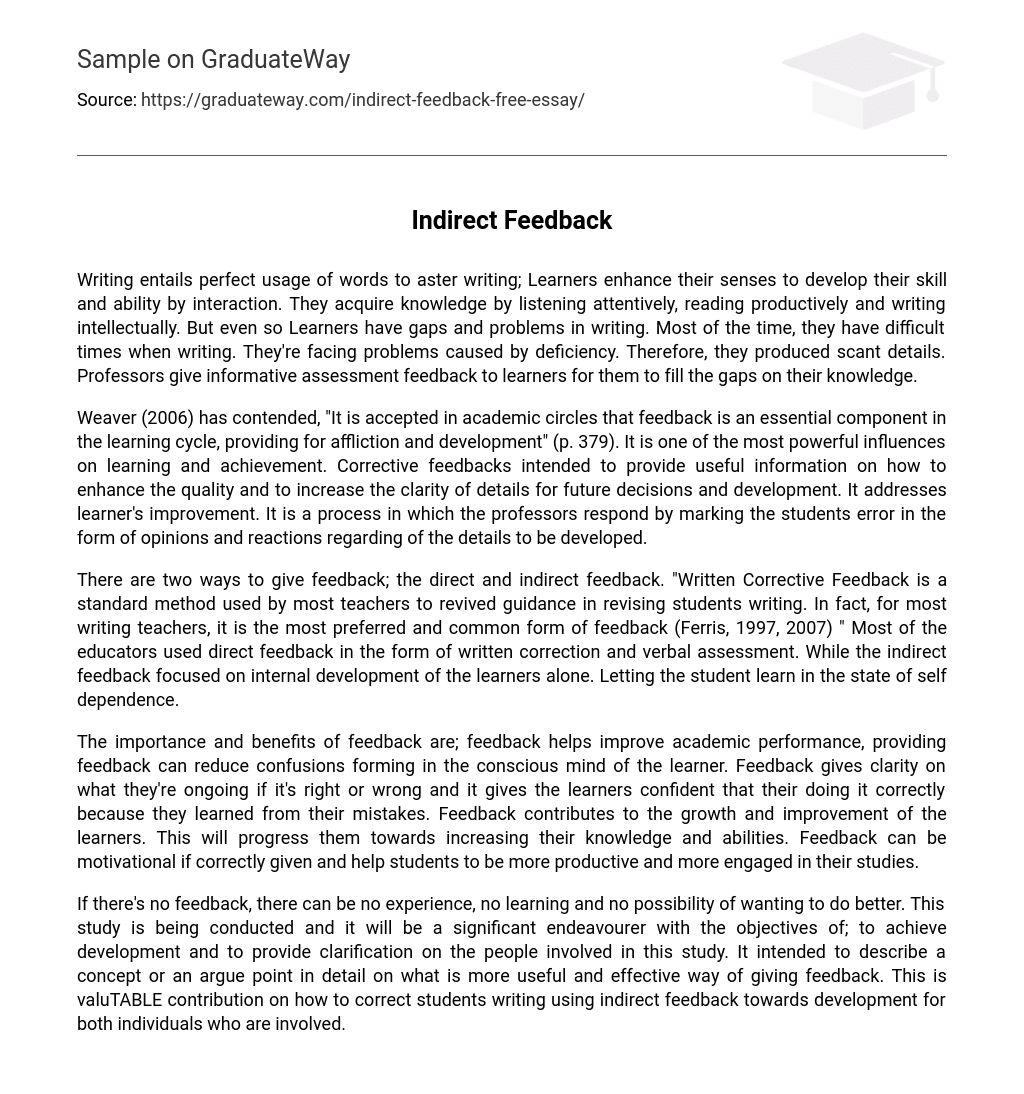Writing entails perfect usage of words to aster writing; Learners enhance their senses to develop their skill and ability by interaction. They acquire knowledge by listening attentively, reading productively and writing intellectually. But even so Learners have gaps and problems in writing. Most of the time, they have difficult times when writing. They’re facing problems caused by deficiency. Therefore, they produced scant details. Professors give informative assessment feedback to learners for them to fill the gaps on their knowledge.
Weaver (2006) has contended, “It is accepted in academic circles that feedback is an essential component in the learning cycle, providing for affliction and development” (p. 379). It is one of the most powerful influences on learning and achievement. Corrective feedbacks intended to provide useful information on how to enhance the quality and to increase the clarity of details for future decisions and development. It addresses learner’s improvement. It is a process in which the professors respond by marking the students error in the form of opinions and reactions regarding of the details to be developed.
There are two ways to give feedback; the direct and indirect feedback. “Written Corrective Feedback is a standard method used by most teachers to revived guidance in revising students writing. In fact, for most writing teachers, it is the most preferred and common form of feedback (Ferris, 1997, 2007) ” Most of the educators used direct feedback in the form of written correction and verbal assessment. While the indirect feedback focused on internal development of the learners alone. Letting the student learn in the state of self dependence.
The importance and benefits of feedback are; feedback helps improve academic performance, providing feedback can reduce confusions forming in the conscious mind of the learner. Feedback gives clarity on what they’re ongoing if it’s right or wrong and it gives the learners confident that their doing it correctly because they learned from their mistakes. Feedback contributes to the growth and improvement of the learners. This will progress them towards increasing their knowledge and abilities. Feedback can be motivational if correctly given and help students to be more productive and more engaged in their studies.
If there’s no feedback, there can be no experience, no learning and no possibility of wanting to do better. This study is being conducted and it will be a significant endeavourer with the objectives of; to achieve development and to provide clarification on the people involved in this study. It intended to describe a concept or an argue point in detail on what is more useful and effective way of giving feedback. This is valuTABLE contribution on how to correct students writing using indirect feedback towards development for both individuals who are involved.
Through this study we can attain the benefits of feedback and use it as an advantage not just in learning institutes but in our daily living. II. Statement of the problems The study intends to investigate the benefits of feedback in the field of earning industry particularly in tertiary level. Specifically, the study seeks to find answer in problems which are: 1 -Do students value feedback specially in writing process? 2. According to their capability of understanding and learning, what feedback do students prefer to receive from their educators? 3.
What are student’s perceptions of written feedback? Ill. Discussion 1. Do students value feedback in writing process? Strut (1997) found that “students were interested in receiving feedback on both global issues (I . E. , content, organization, and purpose) and local ones (I. E. , sentence structure, word choice, and grammar). Yes, they do put value on feedback that they’re receiving because feedback is important factor in learning cycle. For does students who were weak and have a lot Of deficiency, looked forward receiving a feedback from their professor and used it as a guide for revision.
But some cannot identify and correct errors even if they were already marked for them because they are not familiar in code errors. 2. According to their capability of understanding and learning, what feedback do students prefer to receive from their educators? “Surveys of students’ feedback preferences generally indicate that L 2 students refer teacher written feedback to alternative forms such as oral and peer feedback” (Gaits, 1994; Ghana, 1995). As Ferris (2006) found that students utilized direct feedback more consistently and effectively than indirect types.
Perhaps it’s because the errors in direct feedback are explicit, In a way that it is clear and obvious. Students think it is easier for them to learn and correct the errors with less time spent thinking and less effort spent. As Lee (1997) points out investigated the performance of SSL college students in Hong Kong and found out that the students corrected more errors when the errors were underlined or indicated. The students also indicated that they preferred comments that provided advice, included explanations, and employed open- ended questions.
Therefore, when giving feedback on student errors, writing teachers should also give students comments on their content and provide several tips on how to improve their writing. But the idea of micelle contrasts it because of what he stated. Students feel that indirect feedback is useful in encouraging them to reflect on aspects of their writing and to develop improvements (Micelle, 2006). 3. What are student’s perceptions of written dieback? According to Leek (1991) Grammar feedback has been view as helpful by college level SSL Students. Any form of feedback intended to develop the students writing skills.
Students appreciate feedback because it serves as guide in revising. As chi (1999) points out, students appreciate comments that reflect the teacher’s involvement and engage them in an exchange about their writing. It gives the student a motivation to pursue writing skills.





